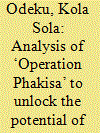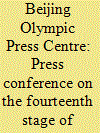| Srl | Item |
| 1 |
ID:
178277


|
|
|
|
|
| Summary/Abstract |
South Africa is endowed with vast ocean resources and wealth which have the potential to provide enormous socio-economic goods and services to the people and create massive economic growth and wealth if vigorously explored and tapped. This assertion is made against the backdrop of the recent government strategical initiative, under the auspices of ‘Operation Phakisa’, to unlock and explore the full potential of the ocean’s wealth to drive economic growth, create jobs and alleviate poverty. This paper seeks to accentuate that the Operation Phakisa initiative has the potential to strategically unlock underexplored ocean resources for purposes of creating sustainable economic growth, development, and alleviation of hunger and poverty. It concludes that effective and sustainable use of the ocean’s wealth depends on good, efficient governance policies, practices and management. Methodically, a qualitative non-empirical research approach was adopted and utilized in this study by sourcing, drawing upon and using information and insights from contemporary literature to address identified problems.
|
|
|
|
|
|
|
|
|
|
|
|
|
|
|
|
| 2 |
ID:
079960


|
|
|
|
|
| Publication |
2007.
|
| Summary/Abstract |
The Shanghai Municipal Government's environmental complaints system allows citizens to report environmental problems to local authorities and provides timely feedback regarding how the complaint was resolved. Using both statistical data and case studies, we conduct a qualitative analysis of the system's costs and benefits as of early 2002. The analysis shows that the complaints system is an important, yet somewhat unreliable source of information about the many environmental problems not otherwise detected by regulators. Moreover, the opportunity cost of the system is significant; the system is dominated by nuisance complaints that are either trivial or without significance to environmental quality except at a very limited geographical scale. Analysis of patterns in the case studies provides the basis for constructing hypotheses concerning whether a particular pollution problem is likely to be the subject of a complaint. This offers insights into how the system could be improved so that the benefits of citizen involvement could be enhanced
|
|
|
|
|
|
|
|
|
|
|
|
|
|
|
|
| 3 |
ID:
090111


|
|
|
|
|
| Publication |
2009.
|
| Summary/Abstract |
In the published literature, the differences in environmental performance across countries are typically explained using the Environmental Kuznets Curve. The Environmental Kuznets Curve states that pollution initially increases with economic growth. Once GDP per capita reaches a certain level, the relationship reverses. In the present paper, we provide an alternative hypothesis, where budget structure plays an important role in explaining the variations in pollution across the world: the lower the business-related taxes as a share of total tax revenue, the higher the property tax in total tax revenue and the higher the ratio of public health expenditure in total expenditure, then the stronger the incentive of pollution control and the lower the pollution level. Our empirical findings reveal that the budget structure does have an important impact on pollution control. The policy implication of this research is that effective control of environmental pollution requires changes in tax structure and expenditure assignment. This research has important policy implications for China's tax system reform and pollution control efforts.
|
|
|
|
|
|
|
|
|
|
|
|
|
|
|
|
| 4 |
ID:
089952


|
|
|
|
|
| Publication |
2009.
|
| Summary/Abstract |
The free market has eliminated environmental hazards in the past, from leaded gas to acid rain, and it can solve the problem of climate change today. A cap-and-trade system offers the best hope for reducing pollution and encouraging green growth.
|
|
|
|
|
|
|
|
|
|
|
|
|
|
|
|
| 5 |
ID:
073230


|
|
|
| 6 |
ID:
039441


|
|
|
|
|
| Publication |
New Delhi, Fertilizer Association of India, 1979.
|
| Description |
viii, 230p.
|
|
|
|
|
|
|
|
|
|
|
|
Copies: C:1/I:0,R:0,Q:0
Circulation
| Accession# | Call# | Current Location | Status | Policy | Location |
| 022942 | 363.728/TRI 022942 | Main | On Shelf | General | |
|
|
|
|
| 7 |
ID:
087155


|
|
|